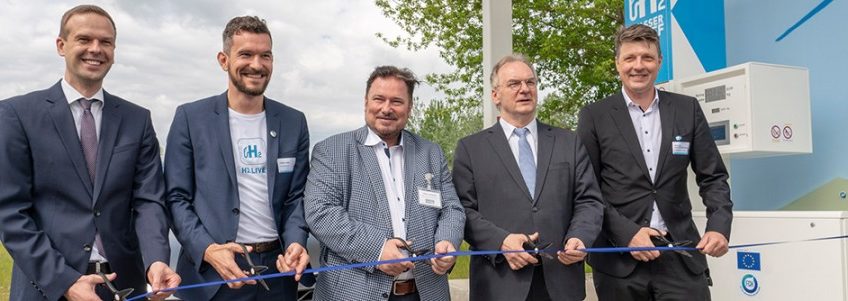Drivers of fuel-cell powered electric cars can now refuel in the German city of Halle an der Saale. Dr. Reiner Haseloff, Minister President of Saxony-Anhalt, joined partners PS Union, H2 MOBILITY Deutschland and Linde, in opening the federal state’s second hydrogen station today on the PS Union grounds at Blücherstraße 7.
Germany’s hydrogen filling station network is becoming denser and denser. Already, there are 70 public stations that offer hydrogen (H2) at 700 bar for fuel-cell cars. Another 30 filling stations are under construction. By the turn of the year, hydrogen car drivers will have around 100 H2 filling stations at their disposal [across Germany]. The station at Blücherstraße 7 is located in the northern part of the Neustadt district, not far from the Bundestraße 80 highway, and closes the network gap between Leipzig and Magdeburg.
The project ownerr is H2 MOBILITY Deutschland – a joint venture that is expanding the hydrogen infrastructure in Germany. Its shareholders are Air Liquide, Daimler, Linde, OMV, Shell, and TOTAL. BMW, Honda, Hyundai, Toyota and Volkswagen as well as the NOW GmbH National Organisation Hydrogen and Fuel Cell Technology advise H2 MOBILITY in their capacity as associated partners. The filling-station technology in Halle (Saale) comes from the gas and technology company Linde. The station is state-of-the-art. Operation of the filling facilities is intuitive; the process is similar to refuelling conventional vehicles and takes three to five minutes.
The deciding factor in the choice of location was the application submitted by the cooperation partners PS Union, JEZ! mobil, Kooperationswerk Chemie+, isw gGmbH, Fraunhofer Institute for Microstructure of Materials and Systems IMWS, and Stadtwerke Halle to the H2 MOBILITY Standortaufruf (Call for Locations) 2017, in which Halle prevailed over nearly 30 competitors. The H2 filling station will be integrated into the region’s innovative mobility concept: ten hydrogen-powered vehicles will be added to the PS Union’s Group JEZ! mobil car-sharing offer, and the Stadtwerke Halle municipal utilities will use hydrogen vehicles in their company car-sharing program. The Fraunhofer IMWS and the Fraunhofer Center for Silicon Photovoltaics CSP will also use hydrogen vehicles and collect research data for their further optimisation. Other companies that will be supplementing their vehicle fleets with hydrogen-powered vehicles include municipal waste disposal and housing companies.
E-Mobility with hydrogen reduces CO2 emissions
Hydrogen offers an opportunity to expand the range of fuels available in the transport sector in a climate-friendly way: the use of hydrogen produced with renewable energy can significantly reduce climate-damaging carbon dioxide (CO2) emissions. Operating a hydrogen-powered fuel-cell vehicle causes no local pollutants or CO2 emissions. The range of these vehicles is between 500 and 700 kilometres on a full tank. For the construction of the hydrogen station in Halle (Saale), H2 MOBILITY received funding from the Fuel Cells and Hydrogen 2 Joint Undertaking (FCH 2 JU). The Joint Undertaking is supported by the EU Horizon 2020 Programme for Research and Innovation, as well as by Hydrogen Europe and Hydrogen Europe Research.


